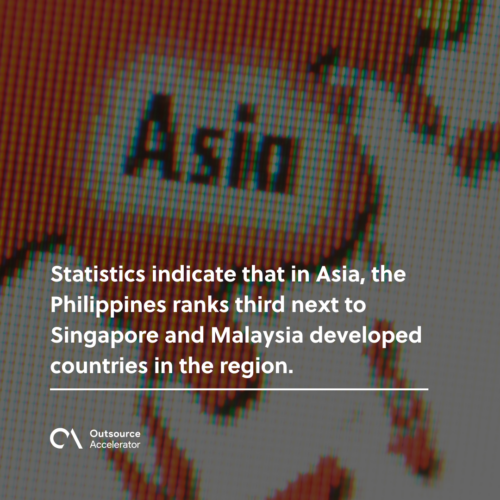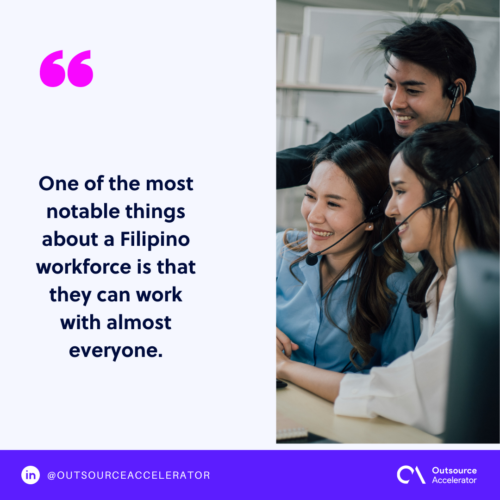5 Reasons why Filipino BPO is a brand of its own

The Pearl of the Orient houses the acclaimed “Happiest people of the world” at a staggeringly highly populated working force of 42.5 million last year. Along with that, are many other reasons really to consider the Philippines as a source of BPO.
Let’s get to the five reasons why it’s a worthy choice:
They’re hard workers
You can ask the employers of overseas Filipino workers the amount of tenacity and dedication Filipinos put in their work. Considering more than 2.2 million Filipinos actually worked overseas back in 2016, it is likely that this has increased to meet present trends in various industries.
Filipino BPO employees often have to endure heavy city traffic (both ways) just to work for eight hours, at least five times a week. On top of a grueling commute, they still put their best foot forward when working.
They’re good English speakers
Statistics indicate that in Asia, the Philippines ranks third next to Singapore and Malaysia — two more (and more is an understatement) developed countries in the region.
Considering how Philippine society wrestles with many issues, ranking third overall proves that even in slippery circumstances, Filipinos still learn other languages, especially if it involves a job opportunity. Considering how the universal language is shifting, it is likely, they’d adjust just as they did before.
Most of the labor force came from a rigid educational curriculum that reiterates English as a second language. Not to mention that college students are taught that most companies encourage using English as their primary language in the workplace.

They’re good for customer service and client-oriented jobs
Why, though? Like most Asian countries, Filipinos mostly use a relational approach to conversations, be it with each other or in the business setting. This means that they delve deeper into the conversation and that depth can spell a higher client conversion rate for foreign companies.
Relational conversationalists tend to relate and approach conversations to relate to the person. This means more empathy, attachment, and warmth which shows they care. This leads to more business success when aptly applied. In fact, it is a standard for Filipino customer service providers.
It’s no surprise that Filipinos are often considered to be one of the most hospitable people in the world. It’s one of the reasons why they make up great customer service specialists—not only do they want to help people, they derive pleasure in doing so.
This is to counter the fact that customer service is one of the most fast-paced environments in the BPO sector, each transaction is counted and therefore must be meaningful to both parties.
They’re malleable
Growing up in a developing country does put a lot of constraint on one’s access to skills development and growth, however, this also brings more emphasis to one’s adaptability. With adaptability comes a broad set of skills and witty workarounds through various applications and processes. We have to consider that there’s no gain without pain.
Growing up in difficult circumstances as a standard has its perks, therefore. Give them the night shift, some extra workload, or OT slots, they’re likely going to adapt to it as long as they’re compensated accordingly.
Flexible shifts? Permanent graveyard shift? BPO employees, both agents, and non-agents, are already used to this setup. As most of us know, the Philippines is situated at least 12 hours ahead of most of North America.
Some clients may come from Australia and Europe which would make them work hours just ahead of the typical 9-5.
They’re naturally team-oriented thinkers
Collectivistic countries like the Philippines mostly tend to think of the “we” over the “I” of things. And in many businesses, effective teamwork does make the dream work.
Because most of them relate to the team and ensure the team stays intact, conflict resolution becomes more effective. With less conflict and more cohesiveness, you’ve got yourself a special task force crew ready to own your company’s goals and beyond.
One of the most notable things about a Filipino workforce is that they can work with almost everyone. Projects are done ahead of schedule, outputs are brimming with effort and quality, accomplishments are recognized beyond expectations.
In conclusion, while saving money for the same or even better quality of service, your return on investment will flow smoothly by considering the Philippines for your BPO interests.You got yourself an industrious, adaptive, malleable, empathetic, hospitable, team-oriented, and English-proficient workforce.
And these days, such a spectacular sort of return of investment for quality work is a needle in a haystack — unless you look in the right place; the Philippines is.

Philippines: The world’s call center capital
All the reasons mentioned above are what pulled foreign investors to found their multinational, multimillion-dollar companies on the Filipino market. With a raging economy and a handsomely young workforce with degrees, the Filipino labor market is one big fish pond for international conglomerates.
Out of hundreds of BPO companies that make up the outsourcing industry, we get to choose which ones were affecting the sector the most: top 40 BPO companies in the Philippines.
The Philippines closely competes with India, Mexico, China, and South Africa for the title, and yet, the others are thriving in the other sectors of the outsourcing and offshoring world.
As written by Philstar in 2018, in an article named Philippines remains world’s call center capital — CCAP, “Under its existing roadmap, CCAP expects the sector’s revenue to rise to $20.4 billion by 2022.”
Undoubtedly, the sector will continue to rise, giving countless opportunities to the Filipino people.







 Independent
Independent




